Maintenance of gas boilers: current service and overhaul
Round-the-clock operation of boilers leads to their increased wear. Do you agree that the operation of heating and water heating equipment should be safe? Why do periodic inspections and repairs of gas units.
Prevention with the identification of existing defects helps prevent emergencies. Who should service gas boilers and what set of measures does it include? These are the issues we will examine in detail in the article.
Our material contains a description of the main stages of service events, step-by-step photos of maintenance. In addition, we selected videos on the maintenance of the boiler and its components.
The content of the article:
Service Tasks
Each user of a gas boiler counts on its long operation. But the durability of the equipment depends on many factors.
Uninterrupted operation of the boiler leads to a rapid deterioration of its working elements and assemblies, and an unstable supply of natural gas leads to premature failure of an expensive device.
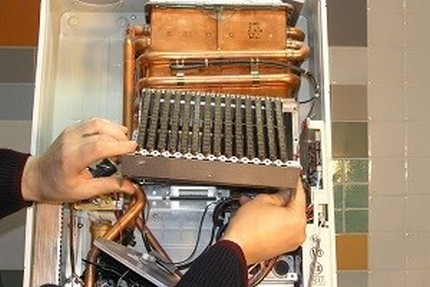
The first maintenance according to the rules must be carried out six months after the end of the warranty period.
The frequency of technical inspections and troubleshooting is established on the basis of an agreement concluded between a representative of the technical economy and the owner of the equipment.
During the scheduled inspection, the representative of the gas sector draws attention to the following points:
Failures of gas units identified between the ongoing maintenance activities are eliminated at the request of the owners of gas boilers by the employees of the organization with which the contract was concluded.
After-sales service of the boiler is designed to solve three problems at once:
- Monitor devices automatic regulation.
- Check the correct functioning of the burners.
- Determine the current state of the internal heating elements of the operated equipment.
Each of these aspects is of primary importance in maintaining efficiency at the initial level and extending the life of the boiler system as a whole.
In addition, a gas worker performing maintenance on a gas boiler is required to inspect the condition of the taps and metal piping connections. He must evaluate the performance of ventilation and smoke ductstightness of nodes.
During the current inspection, a visual control of gas combustion is carried out, and, if necessary, the burners are adjusted. Assessment of the tightness of the compounds is carried out using a soap solution or using gas detectors.
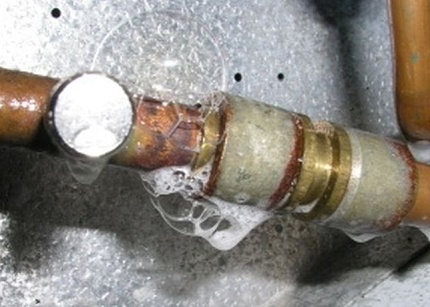
All identified violations should be eliminated immediately after detection. The performance of parts and mechanisms is being restored, in case of impossibility of repair, a replacement is performed.
If necessary, parts and components of gas heating equipment are repaired in the workshop of the gas economy, with which a service contract has been concluded.
Professional solution to the issue
At first glance, there is nothing complicated in carrying out preventive measures for servicing boiler units. But to engage in self-tuning and cleaning the gas boiler is not worth it. And the question is not only in experience.
Such a responsible procedure should only be performed by a qualified specialist who has the exact equipment necessary for diagnosing malfunctions.
The quality of maintenance of boiler equipment directly depends on the professionalism of the master. Therefore, such work should be entrusted only to professionals with special access.
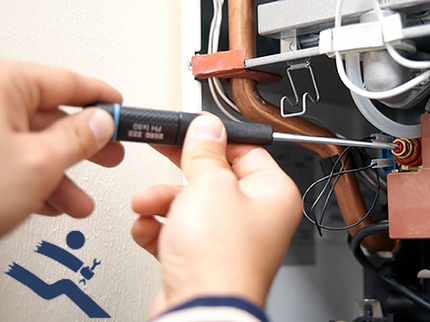
According to paragraph 6.2 of the current Construction Norms and Regulations, service of boiler equipment must be carried out by licensed organizations that have at their disposal an emergency dispatch service.
Leading manufacturers of gas boilers, in order not to open branded service centers in each region of the country, issue licenses to organizations specializing in the field of technical maintenance.
You may be interested in information on how to choose a good and reliable gas boiler, discussed in our other article.
In addition to a certificate for the performance of a given range of work, such organizations receive full access to technical documentation for equipment manufactured by the manufacturer, as well as the ability to obtain new boiler components for warranty replacement. A list of certified companies is usually listed on the manufacturer’s website.
When choosing a service organization and drawing up a contract, you should focus on two parameters:
- Boiler manufacturer certification, as evidenced by the availability of a license to carry out work.
- The location of the service center in the same city or region, which will reduce the response time of the visiting master.
In most cases, a service contract is signed before the boiler is fully operational. It clearly spells out a list of future work and the timing of their implementation.
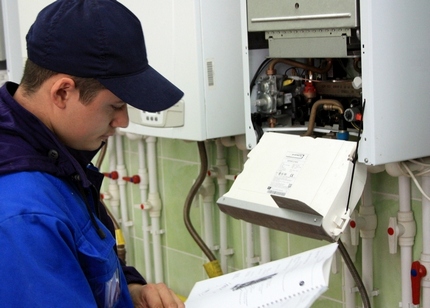
The services offered by service organizations are divided into three types:
- Ongoing maintenance - regular preventive work carried out to assess the technical condition of the unit, to identify and eliminate impending breakdowns, to prepare the unit for the heating season and after its completion before summer inactivity.
- Subscriber request service - includes measures to detect violations and damage to the system, diagnostics of the gas apparatus or its individual parts, elimination of breakdowns and malfunctions.
- Overhaul - a set of measures in case of breakdown of the unit, carried out in case of emergency situations, provoked by the influence of external factors or as a result of breakdown of equipment.
The frequency of preventative maintenance of equipment depends on the destination of the installed unit and its design.
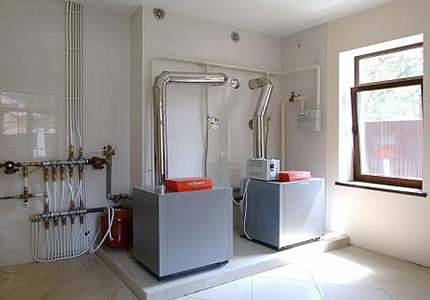
On average, routine inspections are recommended 2 times a year. They are carried out both for devices included in the heating circuit, and for units of domestic hot water systems.
Failure to comply with the timing of such an important event can lead to grave consequences. So, clogging of the pipeline can cause a malfunction of the heating system, and gas pipeline depressurization - the cause of the explosion and fire.
The main steps of the current service
To fully control the situation, you should understand what work is performed when servicing various parts and assemblies. Routine maintenance of the boiler generator includes three main types of work: cleaning, checking and adjusting.
Before carrying out service maintenance of gas equipment, the system and gas supplies are disconnected without fail. A disconnected system should cool down a bit.
Step # 1 - inspection of heating circuits
At this stage, a general idea of the current state of the operating system is formed.
First of all, the master checks the documents and the warranty seal, determining the compliance of the gas apparatus installation with the requirements of two main regulatory documents:
- SNiPu - sanitary construction norms and rules.
- "The rules of technical operation and safety requirements in the gas industry of the Russian Federation."
Since a gas boiler is a set of equipment for which gas and electricity are used, electrical elements are also subject to visual testing.
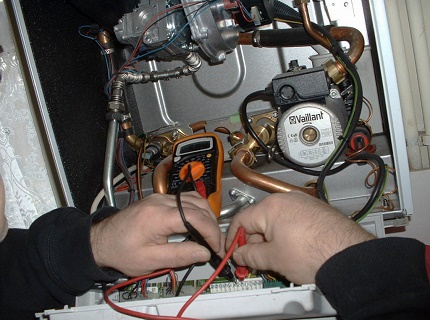
Checking the status of the boiler is designed to clarify the following points:
- device design integrity;
- gas valve pressure;
- ignition electrodes, if any;
- the condition of the gas supply connections;
- operability of electronics;
- serviceability of emergency machines.
At this stage, control and swap expansion tank, which is designed to protect the elements of the system and compensate for the pressure that is created during the expansion of the coolant.
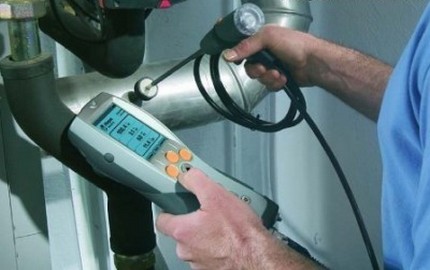
The pressure level in the state of cold water, depending on the type of boiler, is 1.1-1.3 bar. It is important to ensure that after heating, the pressure does not exceed the recommended standard specified in the passport to the unit.
Step # 2 - cleaning system elements
Before starting work, empty the boiler. After that, they begin to inspect the gas burner, determine the quality and direction of the flame.
To do this, remove and sequentially clean:
- retaining washer - a device that regulates the position of the torch torch relative to the installed heat exchanger;
- air sensor - it is designed to regulate the ratio of the mixture of air and gas;
- flame detector sensor - it generates a signal when the traction indicators deteriorate;
- ignition device electrode - is responsible for setting fire to gas-air mixtures;
All metal structures under the influence of high temperatures and subsidence of soot are able to deform over time.
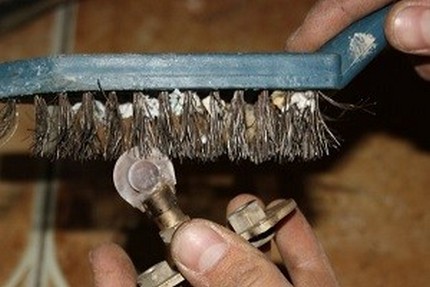
During normal burner operation, the flame has the shape of a cone painted in a blue tint. A yellowish color indicates its contamination.
Testing and analysis of the exhaust gases of the boiler will help to check the operation of the key working element of the boiler and assess the compliance of the burner settings with the composition of the supplied gas, as well as the completeness of its combustion.
The firing area on the fuel combustion chamber and all parts of the boiler that are in direct contact with the torch are subject to cleaning. This task can easily be done using a soft brush and a vacuum cleaner.
When cleaning nozzles, it is not allowed to use a metal brush whose bristles can damage the surface.
Separately, they unscrew and purge the gas channels of the boiler with air.The gas pipe leading to the burner is removed, disassembled and purged under pressure.
The heating system is equipped with two filter elements. The first is located in the hydraulic unit, and the second - on the tap with cold water. These filters also require periodic cleaning of salt deposits by rinsing.
As the maintenance is carried out, all the failures discovered by the master are eliminated without fail, replacing failed parts and assemblies with new elements.
Step # 3 - checking the control automation
Boilers of modern production are equipped with automatic control systems, the main purpose of which is to ensure the operation of the unit without constant human supervision. In terms of complexity, automation can be very different.
But regardless of the model, its main elements are:
- Thermostat - a regulating device responsible for maintaining the set temperature parameters of the coolant in the boiler.
- Gas valves - designed to open and close the gas supply.
- Gas fittings - an actuator designed to work out the commands of the boiler control circuit.
- Controller - an electronic device designed to implement a complex unit control algorithm depending on changing environmental conditions.
- Minimum and maximum pressure switch - membranes acting on contact groups, turning off the unit in case of pressure drop / increase below / above the setting value.
This technique "painfully" tolerates a regular decline in stress. The task of the wizard is to timely detect problems in the electronic system, possible problems with parts and correctly adjust automation.
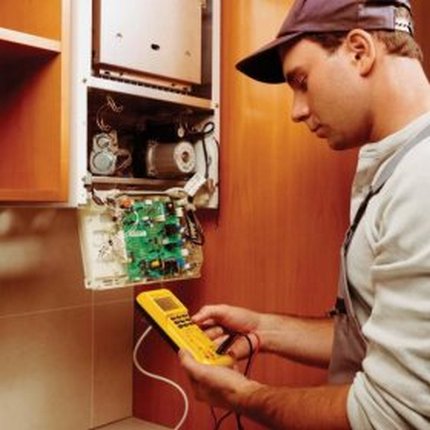
To check the operability of the boiler safety system and identify vulnerable areas of equipment, the master imitates the occurrence of an emergency. After starting the system, he monitors the speed of the alarm, the tightness of the cut-off valve and other devices.
If the automation does not work correctly, the unit is disassembled, and failed membranes are replaced with new ones.
The introductory part of the gas pipe is also subject to inspection. It is examined for corrosion and other damage.
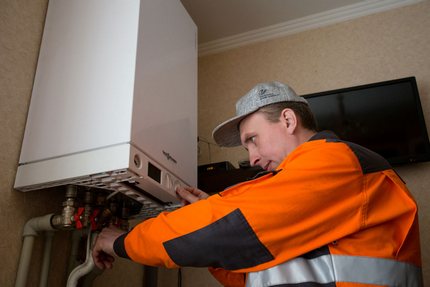
All connections of the gas path, including flanged, threaded and prefabricated, are tested for leaks. Measure the pressure in the gas pipeline. If necessary, adjust the gas fittings. Places where paint has peeled off the surface of the pipe is repainted.
After adjusting all the units of the boiler, the wizard sets the parameters recommended by the manufacturer.
At the final stage, it carries out a final check of the boiler. The master fills in the certification documents, confirming with his signature personal responsibility for the quality of the audit. Finally, he makes a memo indicating the period of the next service.
Overhaul
Upon the expiration of the operational period specified in the passport for the product, the gas boiler is subject to technical diagnosis. The main task of engineering activities is to determine the possibility of further safe operation of the equipment.
Major repairs are carried out in order to restore the technical characteristics of gas heating equipment. As necessary, worn parts and functional units are replaced.
In addition to diagnosing within the framework of capital services, they perform:
- Flushing the heat exchanger.
- Comprehensive inspection and cleaning of all closed components of the boiler.
A competently carried out set of measures is a guarantee of the serviceability of the gas equipment during the subsequent period of operation.
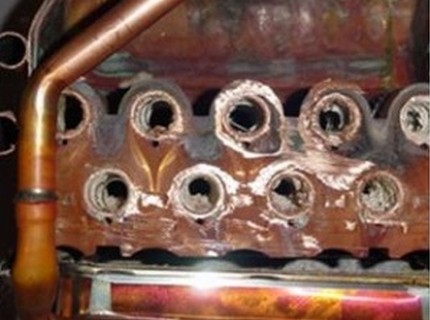
Cleaning the heat exchanger from scale is carried out after the first five years from the date of commissioning of the boiler. Although most service organizations recommend preventive flushing every two years.
A simple flushing procedure of the boiler heat exchanger eliminates the problem at the stage of scale formation.
For thorough cleaning, remove the casing of the device and disassemble all removable parts of the unit. Separately dismantle the heat exchanger and thoroughly rinse it with chemical reagents using a pump station.
This flushing allows you to remove all the scum that has formed in several pipelines and fins of the heat exchanger in a few years. After this, the boiler is assembled and the system is filled with coolant.
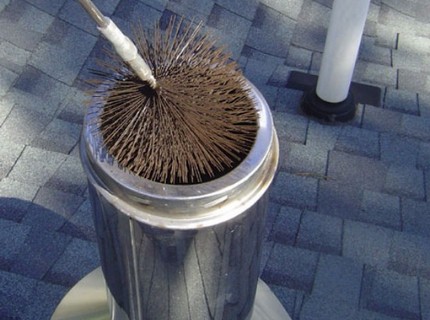
Cleaning of chimneys designed to divert combustion products from gas appliances and create traction is not included in the list of measures required by the master.
He can do this work for an additional fee. If desired, the chimney can also be cleaned on its own. It is advisable to flush it at least once a year.
Operation of the boiler in force majeure
In the event of an emergency, it is necessary to respond to the problem as soon as possible and try to return the boiler to working condition. Failures, if they occur, are just in the heating season.
And the reason for this most often is that the unit operates at maximum power without interruption for a long period.
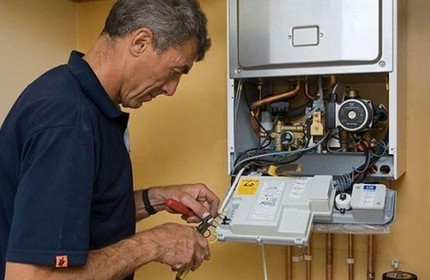
Poor fuel, which is often supplied to the gas system, often leads to the same deplorable result.
Having a service agreement in hand, the owner can only call the organization. Upon receipt of the application, the repair team will arrive at the site and fix the problem.
Since boilers are always kept in service centers, field team specialists arrive at the site with the necessary set of tools and spare parts that correspond to the specific model of the gas boiler installed in the house.
But there are situations when at the peak of the heating season repair crews “break”. And the application can satisfy the master is not as fast as we would like. Some owners in this case resort to the services of "private traders".
But it is worth considering that calling the first "gasman" that is caught is not the best option. And it’s not even the tidy sum that the owner will have to pay. After all, no one guarantees that the master will be able to carry out repairs at a high professional level in an emergency situation.
Therefore, in order to avoid such situations and save unnecessary expenses, one should not neglect the opportunity to conduct a current technical examination before the onset of cold weather.
Conclusions and useful video on the topic
Video about the sequence of actions during maintenance of a gas boiler:
Video burner cleaning guide:
Regular maintenance of the gas boiler allows even at the initial stage to identify emerging problems and not bring the situation to the point where the operation of the equipment begins to pose a threat to the health and life of households.
Are you faced with the need to urgently call a wizard to diagnose a gas boiler? Or did you have to pay for additional services during the maintenance process? Tell us about your situation - perhaps your experience will be useful to other owners of gas equipment. Leave your comments under the article.

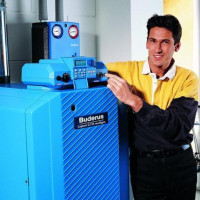 Maintenance and repair of gas boilers "Buderus": methods for dealing with typical breakdowns
Maintenance and repair of gas boilers "Buderus": methods for dealing with typical breakdowns 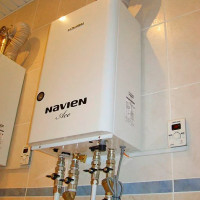 Maintenance of gas boilers Navien: instruction on installation, connection and configuration
Maintenance of gas boilers Navien: instruction on installation, connection and configuration 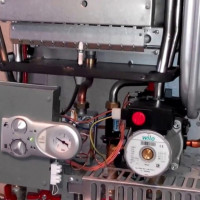 Repair of gas boilers Ferroli: how to find and fix an error in the operation of the unit by code
Repair of gas boilers Ferroli: how to find and fix an error in the operation of the unit by code 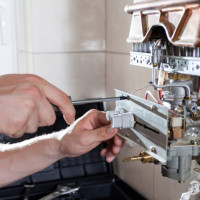 Sensors for gas boilers: types, principle of operation, characteristics
Sensors for gas boilers: types, principle of operation, characteristics 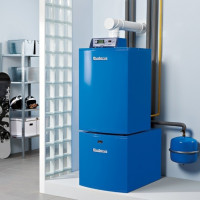 Automation for gas heating boilers: device, principle of operation, manufacturers overview
Automation for gas heating boilers: device, principle of operation, manufacturers overview 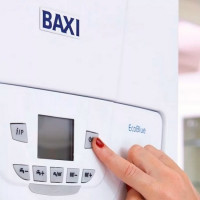 Installation of gas boilers Baxi: wiring diagram and instructions for setting up
Installation of gas boilers Baxi: wiring diagram and instructions for setting up 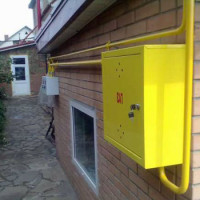 How much does it cost to connect gas to a private house: the price of organizing gas supply
How much does it cost to connect gas to a private house: the price of organizing gas supply  The best washing machines with dryer: model rating and customer tips
The best washing machines with dryer: model rating and customer tips  What is the color temperature of light and the nuances of choosing the temperature of the lamps to suit your needs
What is the color temperature of light and the nuances of choosing the temperature of the lamps to suit your needs 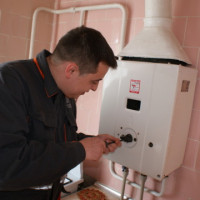 Replacement of a geyser in an apartment: replacement paperwork + basic norms and requirements
Replacement of a geyser in an apartment: replacement paperwork + basic norms and requirements
We call our master to check the gas boiler once every six months - this is both our safety and the guarantee of the normal operation of the boiler. I do not recommend doing this on my own, well, only if you have a special education. Yes, and an obsolete boiler is better to replace immediately than to risk repairing it or even to remain without heat in the house during the heating season.
Entirely and fully support your opinion. This is gas, safety is very important here. We bought a cottage with a gas boiler already installed and next week the first maintenance is due. So now I’m studying the Internet in order to understand what the master is doing and to control so that he doesn’t hack and check everything.
With our level of service, only good money is ripped off, and services are provided anyhow. We concluded a contract before launch. The master came to start, give me money. Then he arrives once a year, with a smart look, opens the panel, looks through his glasses - that's all, give for a visit. I look in the book, puts the marks that I cleaned, checked.
The other day I called them, I say, it’s time to clean the heat exchanger, something hot water does not heat well. The dispatcher answers, you have not yet been scheduled for the deadlines, everything is in order with you.
For its boiler room I also had to look for a normal office. And then a man came from the gas one, he did something for it and dumped it - and they demand money as for a full MOT.